

On October 20, law enforcers broke into a Muslim prayer house in Kotelniki near Moscow and took the congregation (immigrants and Russian nationals alike) to a military base, where they were forced to sign contracts with the Defense Ministry. Although this incident made quite a splash, it wasn't the first one: in recent months, law enforcement raids on immigrants, including in houses of worship, have become a mass phenomenon in Russia. As The Insider found out, such raids are often initiated by groups of nationalist informants who cooperate with law enforcers. They became active last summer and have already formed a subculture. They even have a special mobile phone app that summons them to the location of the conflict and attend lectures given by the “expert” who sent filmmaker Evgeniya Berkovich to prison. The Insider’s correspondent spoke to immigrants whose right to pray is under attack, interviewed residents of the Moscow suburbs who are frustrated with the newcomers, and also attended a gathering of the far-right informants.
Content
“We're afraid to come to pray”
“Indeed, the mosques are unofficial. But they're all we have”
The Russian Community: an alliance between nationalists and law enforcers
“Russians are united! They're here, and they're not going anywhere!” How nationalists hold events in parks and sports grounds
“Yale University is where all the psychos graduate from”: The Russian Community's academic foundations
A tough-guy-hailing app
“If you get killed, how is the money going to help?”
“It's not a pleasant sight when you see nothing but the eyes!”
“We're afraid to come to pray”
“It's empty now, see? People are already afraid to come to pray. Today is Friday, a special day. We always pray salah on Friday together; it's very important for us,” explains Sohrob, a Tajik national and warehouse worker at the Sadovod wholesale and retail market. He moved to Russia three years ago and bought an apartment in the Yuzhny Microdistrict in the town of Kotelniki near Moscow. On the first floor of the nearby apartment building, there’s a prayer room, or “mosque.” There's no sign, but the whole neighborhood knows that dozens, if not hundreds, of believers gather here every Friday. At least, they used to – but today the room is empty.
The quiet town of Kotelniki happens to have become an epicenter of the confrontation between Muslims, locals, and law enforcers, with the latter conducting hundreds of raids since May 2023. The exact number was not reported, but the statistics of Russia’s Ministry of Internal Affairs suggest that over 7,000 foreigners, mostly from Central Asian countries, were deported following detentions and document checks in the week of June 19-25 alone. Those found to have violated Russia's immigration law were deported, and those in possession of a Russian passport were logged in the military register or forced to sign a contract with the MoD. However, summer only saw a handful of such cases, and Muslims were more outraged by the law enforcers’ rudeness than the prospect of being sent to the trenches.
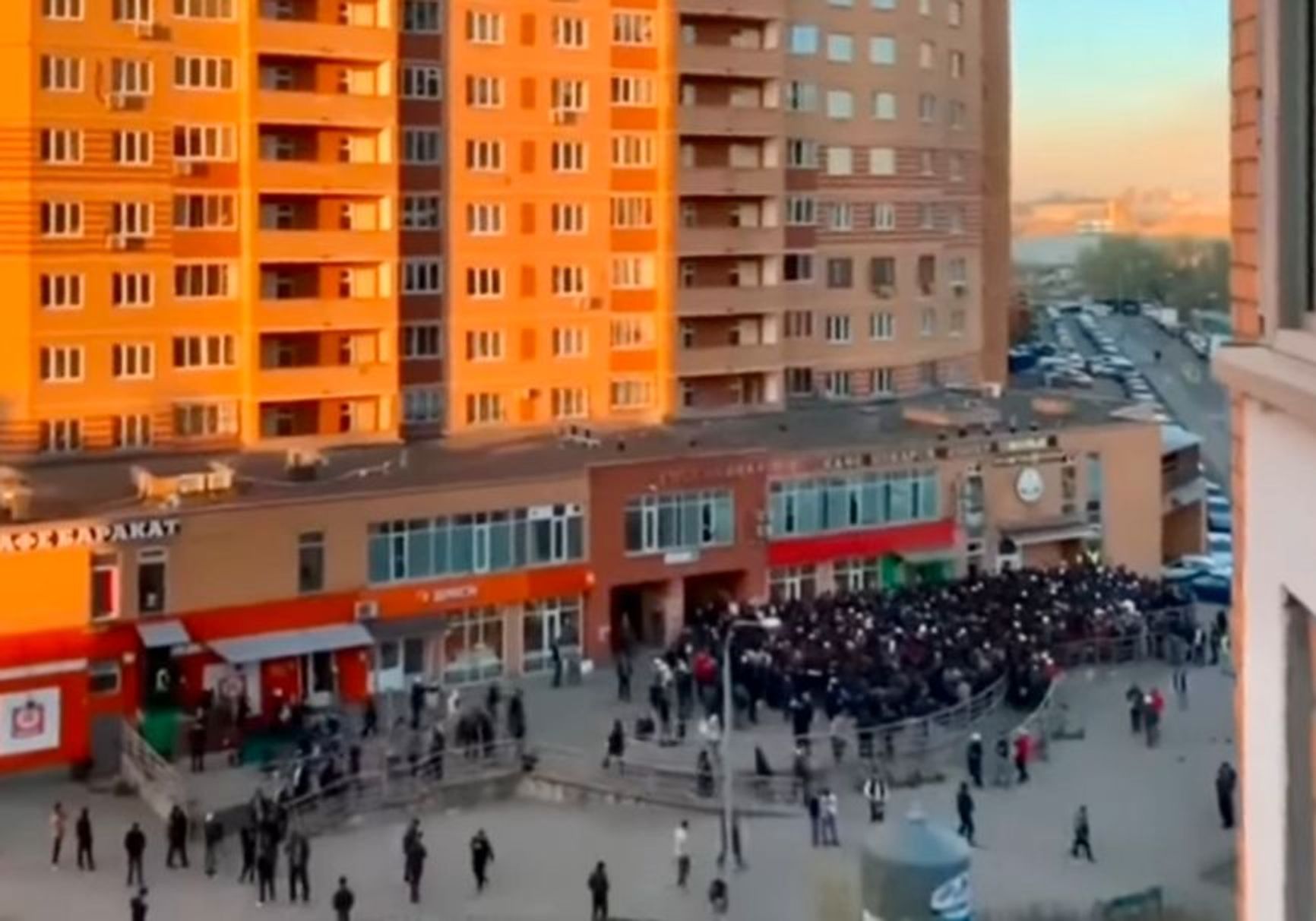
Muslims at the “mosque” in the Yuzhny Microdistrict, April 2023
“Can you imagine, there are 150 people praying salah, and 20-30 riot police burst in. Was that really necessary?” Samir, a halal cafe employee, shows a video on his phone. He happened to witness one of the raids. The law enforcers burst into the prayer house on July 14 in the middle of the Friday prayer, in boots, which is unacceptable according to the rules of Islam, disrupted the prayer, and insulted the congregation. “They said we were filthy, that we washed our feet in the hand sink,” Samir recalls, “They treated us very roughly.
He has no idea why they decided to make a scene instead of just checking the documents at the entrance after the prayer. Officially, the law enforcement raids were directed against illegal immigrants. In reality, they have made life hell for all local Muslims, Samir and Sohrob say.
“They round people up but only check their documents at the precinct. And I’ve got work to do!” Sohrob says. “If they take you to the police, the entire day is wasted. I have a Russian passport and a residential address, completely legal. But you never know how the raid will play out.”
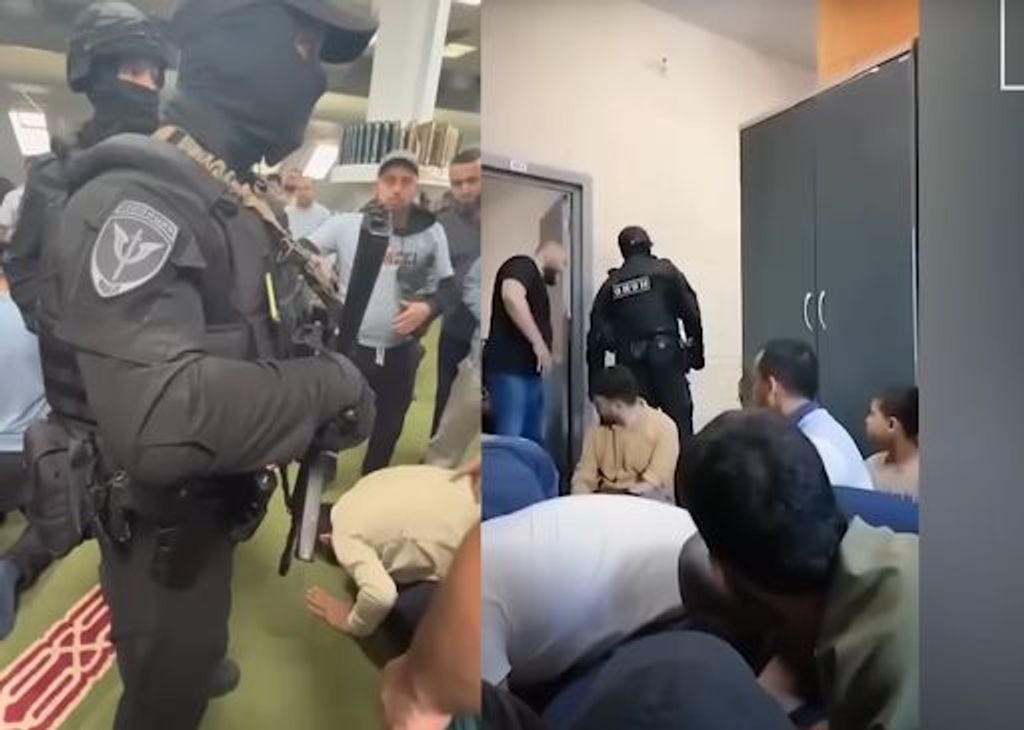
Raids in houses of worship in Dzerzhinsky and Kotelniki
It could also end in a tear gas attack. On July 7, officers without insignia on their uniform broke into the premises of another improvised “mosque” at 5/3 Dzerzhinskoye Highway, also in Kotelniki. They put the congregation face down on the floor and sprayed gas canisters directly into the room. In a panic, the worshippers scurried outside for fresh air. The Spiritual Administration of Muslims of the Moscow Region stated that the raid had been carried out by OMON (riot police) officers.
Another scandal occurred on July 28 in the prayer room occupying the first floor of a high-rise apartment block in 2nd Pokrovsky Thoroughfare. Local Muslims gathering for the traditional Friday Prayer found the entrance closed. Plainclothes police officers at the venue said they'd received a bomb threat in the building. For some reason, the hypothetical bomb didn’t present any danger to the stores in the same building or the tenants living on other floors, since no one had been asked to leave their apartments. The Muslims went to the prayer house on Dzerzhinskoye Highway, but it too turned out to have been “mined” – and so were the remaining two alternative venues.
As a result, some of the worshippers went home, and some others went to pray near the Russian Orthodox temple. They prayed in peace, but the event caused an uproar on social media among Russian nationalists. Traditsionalist, a far-right Telegram channel, branded the prayer a “desecration of the Orthodox shrine and a monstrous provocation” and called for the punishment of “non-believer provocateurs” (in reality, allowing Muslims to pray in a Christian church is not uncommon and is practiced in many countries).
“Indeed, the mosques are unofficial. But they're all we have”
“The houses of prayer in the neighborhood aren't exactly legal,” Sohrob admits, implying that they are not registered as religious organizations but rather operate as cultural centers. “But they’re all we’ve got. Where are we supposed to pray?”
With a Muslim population between 3 and 4.5 million, according to different sources, Moscow has five official mosques. The collective Friday prayer, or Jumu’ah, is compulsory, so “praying quietly at home and keeping a low profile,” as some nationalists suggest, is not an option for devout Muslims.
There are more Muslims in Kotelniki than in any other district in Moscow or Moscow Region – up to the point that you can notice it with your own eyes. The reason for this concentration is Sadovod, a huge wholesale and retail center nearby. There are also a lot of construction sites in the area. Locals mostly live in houses built in the 1970s and 1980s. Immigrants, many of whom are already Russian citizens, settle in new compounds like the Yuzhny Microdistrict.
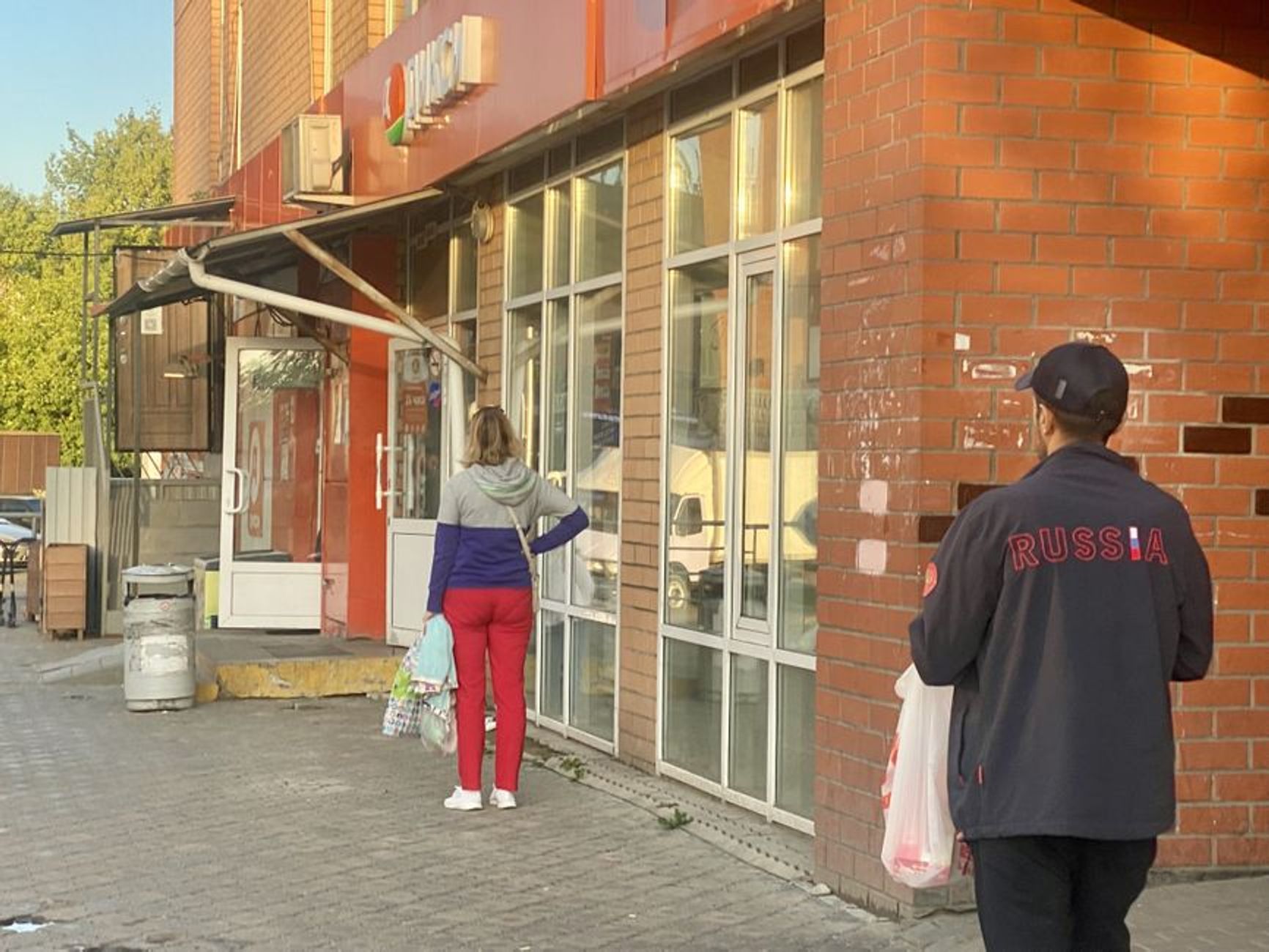
The entrance of the prayer house at 8, Yuzhny Microdistrict, abandoned by its congregation after the raids
Overall, ethnic immigrant enclaves and associated issues aren't typical of Moscow or Russia, as sociologists point out. But Kotelniki has become a vivid example of how law enforcers’ actions can exacerbate social tension. In response to the mass detentions, Muslims staged a protest in the center of Moscow, unofficially called the Takbir Rally. After the Friday prayer on July 21, 2023, several hundred Muslims marched from the Old Mosque on Bolshaya Tatarskaya Street to Tretyakovskaya metro station. They chanted “Takbir!” and “Allahu Akbar,” utterances used both in prayer and in everyday speech.
Having learned about the protest in advance, the Moscow authorities, strongly discouraged immigrants and Russian Muslims working at taxi companies and construction sites from attending. The Spiritual Administration of Muslims of the Moscow Region also issued a warning “not to give in to provocations.”

Leaflets posted at construction sites and a letter from the Dept. of Transportation to taxi companies ahead of the July 21 Muslim rally
After the raids, representatives of the Muslim community of Kotelniki appealed to President Putin, asking him to protect them from the “outrageous actions of law enforcement agencies.” The arbitrary measures also received condemnation from the heads of Russia's Muslim-majority republics: Ramzan Kadyrov (Chechnya) and Sergei Melikov (Dagestan). On the international level, Tajikistan sent a special commission to examine whether Russia respects the rights of Tajik citizens. Dagestani artist Magomed Dibirov also got involved: he created a piece titled Indulgence, depicting the footprints of law enforcers on a prayer mat.
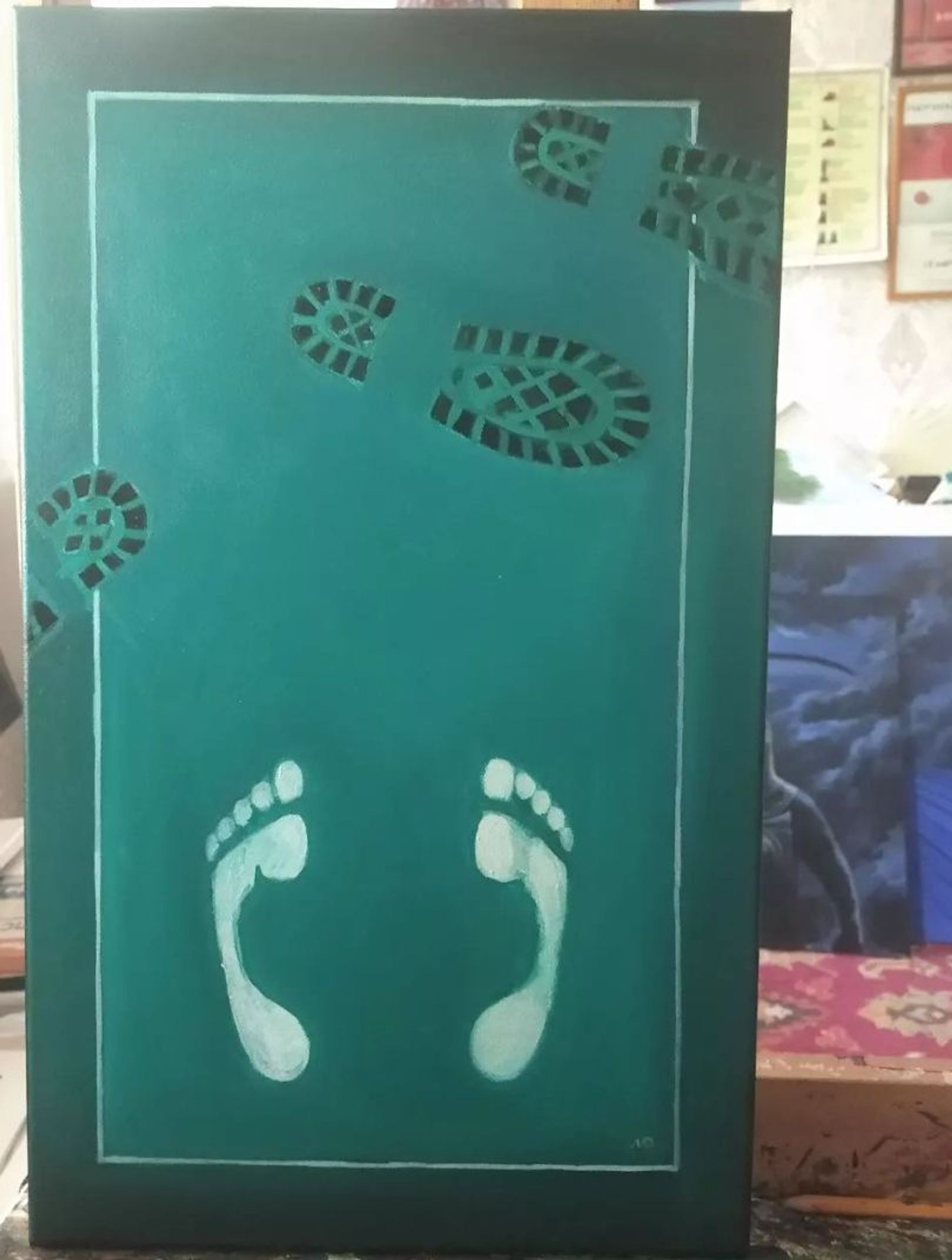
Indulgence by Magomed Dibirov
Formally, the raids were conducted in response to complaints from locals, who detested the fact that improvised mosques attracted “persons of non-Slavic appearance,” who, according to the complainants, had become too numerous and allegedly behaved inappropriately. In May, a group of anti-immigration activists even recorded an appeal to the governor of the Moscow region and Putin, asking to take action. Nationalist groups and so-called Orthodox fundamentalists also claimed responsibility for ordering the raids: throughout the summer, they were actively promoting the idea of sending immigrants to the war in Ukraine
The Russian Community: an alliance between nationalists and law enforcers
“Just now the police, at the request of the Russian community, visited two illegal mosques set up right in residential houses. More than 70 individuals have been detained. We expect to see multiple deportations,” the Russkaya Obshchina ZOV channel wrote triumphantly. If we were to believe its representatives’ claims on social media, it was this community that initiated raids against immigrants in the summer of 2023 across prayer houses, gyms, halal restaurants, and retail outlets. In their online outlets, nationalists explain how they cooperate with law enforcers.
“In total, our guys checked more than 250 people. More than 100 of them were taken to police stations on a variety of administrative charges,” reads a post from July 26. “Thanks to the coordinated work of the Russian Community and law enforcement agencies, regular raids to detect illegal immigrants continue,” reads the July 5 post.
An association calling itself “the Russian Community” formally emerged after the full-scale invasion of Ukraine but didn’t become active until the summer of 2023. Its primary Telegram channel, Russkaya Obshchina ZOV (in which “zov” both translates as “call” and is a pro-war sign), has more than 141,000 subscribers as of mid-October 2023. The association has cells in every Russian region. Since summer, it has been setting up new chat rooms in cities and Moscow's districts.

A Russian Community festival in Saratov, July 2023
The Russian Community attracted other nationalist organizations to its ranks, including the so-called Orthodox fundamentalists from the Sorok Sorokov association and right-wing radicals from the Severny Chelovek (“Northern Man”) Society, which nationalist Mikhail Mavashi registered in 2022. The three organizations cooperate on social media, reposting each other, and offline, arranging events and engaging supporters. “Northern Man and the Russian Community are preparing some exciting moves to help the law enforcers in this regard. Get to work, fellas!” Mavashi writes.
The Community's channels often offer “exclusive” videos of raids. The authors claim that the footage was provided to them by law enforcers. The same thing is happening in other cities: “The Russian Community of Yekaterinburg actively cooperates with law enforcers and helps them in their hard work.”

Nationalists hang flags with their symbols in Tushino Park in Moscow
The Russian Community is registered as a charitable foundation, BF OBSHCHINA, and links its posts in chats to the foundation’s website. Neither the official website nor the documents provide information on organizers or owners. According to SPARK, the registered address of the organization is as follows: 1 Timiryazevskaya Street, Building 2, Floor 7, Hall I, Room 32, 127422 Moscow. Its net assets for 2022 are just over $100,000. The list of its official activities includes financial services, book publishing, exhibitions, recreation, and film production.
As The Insider found out, the Community's co-organizer and director of the associated charitable foundation is Andrei Tkachuk. He is often featured in Russian Community videos. He also heads the Russian Media Center (ANO RUSSKI MEDIA-TSENTR), which shares the address with the foundation. As envisioned by the organizers, the center serves as the Community's media and advocacy wing. The Community actively raised money from its supporters to purchase equipment for the center: “We need our own media!” reads one of the posts. Both the foundation and the center were registered in 2022.
The second co-founder and one of the main ideologists (as his associates call him) is Andrei Afanasyev, an MGIMO professor, a journalist for the Orthodox TV channel Spas, and a patriotic “war correspondent.” Previously, he worked at RT and the far-right Tsargrad channel, whose owner, the “Orthodox oligarch” Konstantin Malofeev, is under EU and U.S. sanctions as one of the primary sponsors of Donbas separatists.
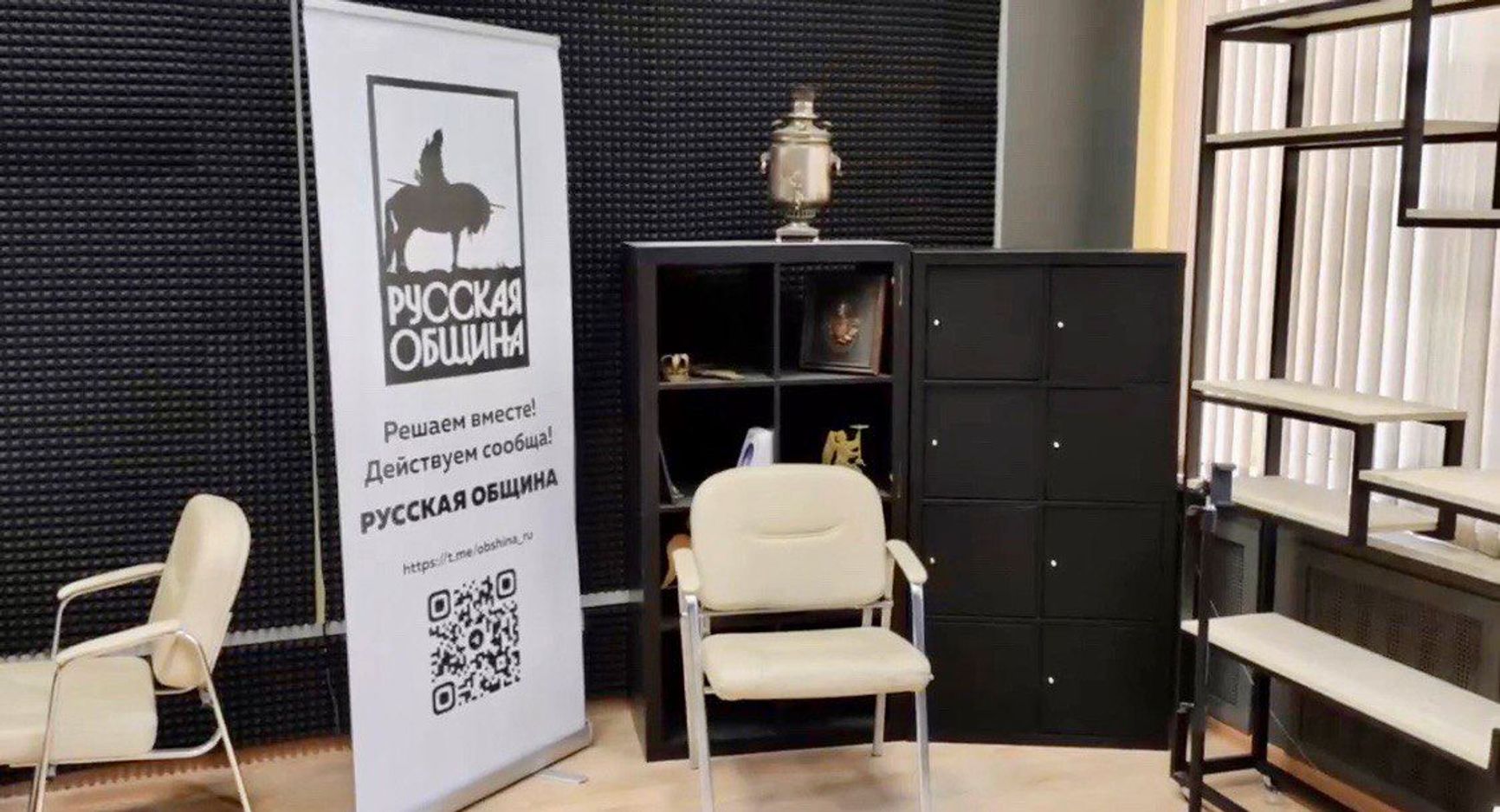
The premises of the Russian Community's media center on Timiryazevskaya Street
The Russian Community stands “against lawlessness and the domination of ethnic diasporas.” However, its structure follows the same lines as an ethnic diaspora in its own country. “A diaspora is a real organized crime group,” Tkachuk notes. Afanasyev, on the other hand, states: “Ethnic Russians need their own diaspora.”

Andrei Afanasyev and Daria Dugina
According to the organizers, it's not your ethnic origin that makes you Russian but your views on the future of the Russian nation. They claim there is no racism in the concept of the Russian Community. However, its chat rooms are rife with racist, Islamophobic, and chauvinistic remarks. Immigrants are referred to by a plethora of derogatory terms that mock their appearance, skin color, and fashion choices. Meanwhile, “belittling ethnic Russians” in chat rooms is explicitly forbidden.
The organization's principles are listed in the pinned post, starting with “This community is ONLY for ethnic Russians.” Other principles include “Russians helping Russians,” “brother for brother,” and “give your life for your friends.” Especially worth highlighting is the principle that “the community's bidding is the law for its members,” which matches one of the signs of a totalitarian sect (unconditional submission to the community or its leader). Taking orders from “sector leaders” is on the list, too.
The principle that “the community's bidding is law for its members” matches one of the signs of a totalitarian sect
Ultimately, Russian Community supporters consolidated around the fight against immigrants – or at least, that’s how they see it. Most of them came around when posts about raids “by the Russian Community” or “at its request” emerged. Of the ten people interviewed by The Insider on September 23, seven cited “immigrants getting out of hand” as the reason for joining the community, and only three cited the need to “unite” and “revive the Russian world.”
Unlike in the 2000s and 2010s, nationalists don’t assault immigrants. Instead, they call for lowering the ratings of non-Russian cab drivers and couriers so that they get fewer orders and have their accounts blocked by the apps. They create services for ethnic Russians like Russky Kuryer (“Russian Courier”). They also carry out online “raids,” writing negative reviews of cafes and restaurants owned or run by immigrants.
Nationalists call for lowering the ratings of non-Russian cab drivers and couriers so that they get fewer orders
Community members visit occupied territories of Ukraine, collect humanitarian aid for locals, and buy drones and thermal imagers for the Russian military. Some of them help in hospitals where soldiers are treated while managing to maintain their dislike of people from the North Caucasus and immigrants, even though many of them are also fighting on the Russian side.
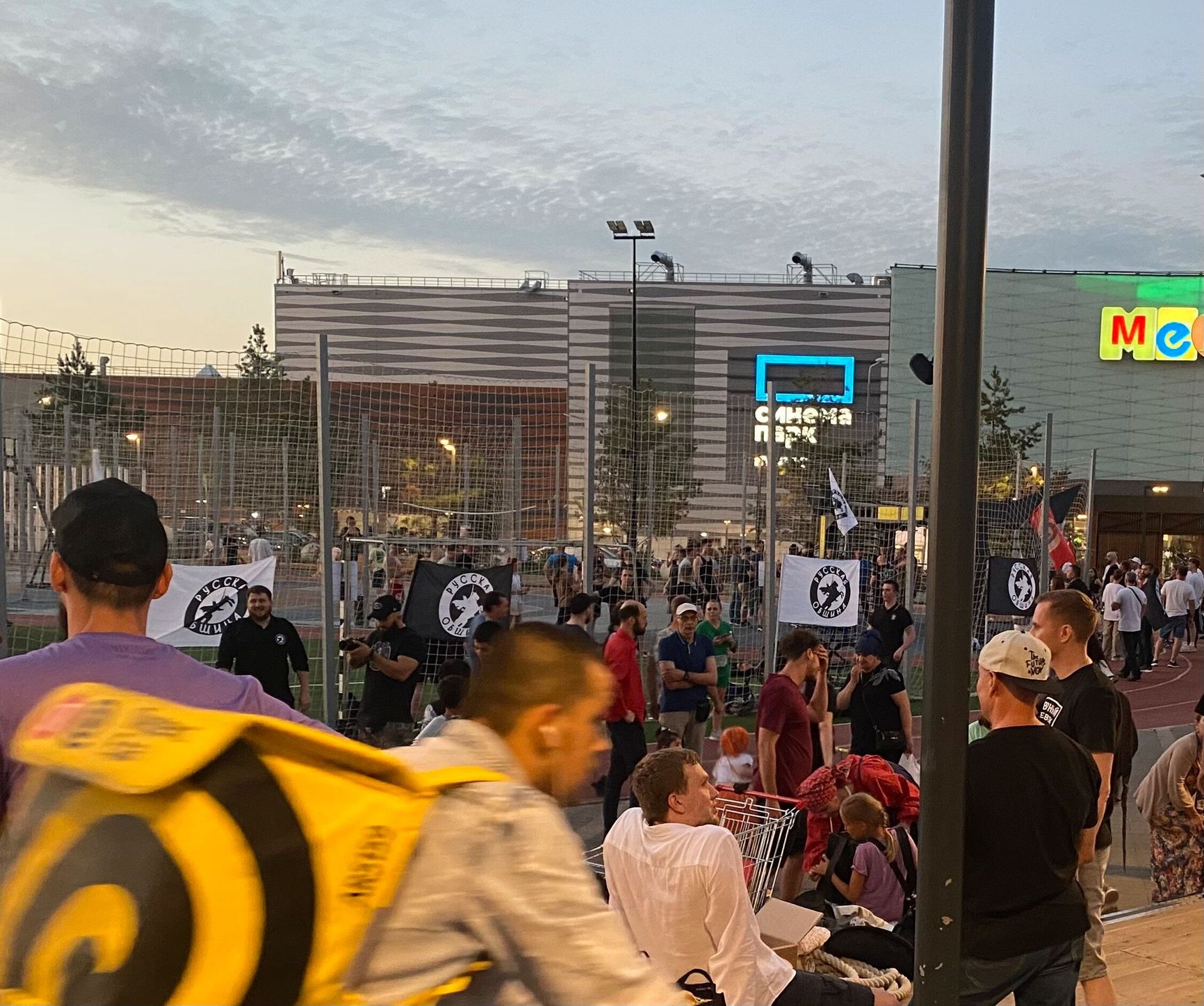
A Russian Community meeting in Khimki outside Moscow
“I just left the ward full of our wounded boys, walking in the street now, and there's no one but [derogatory Russian term for Central Asians] around me,” complains Rita, the participant of the chat room R. O. Vidnoye. “Can you imagine how I feel? Russians are all crippled, risking their lives, and those monkeys are breeding and enjoying themselves on our land.”
The organizers try to take communication offline as quickly as possible, setting up meetings, joint events, and workouts, so that the most active members of the community in a city or town know each other by sight. Users even get personal invitations to “come and get to know each other” – otherwise, they can’t post anything in regional chat rooms or use the app that nationalists have created to coordinate their raids on immigrants.
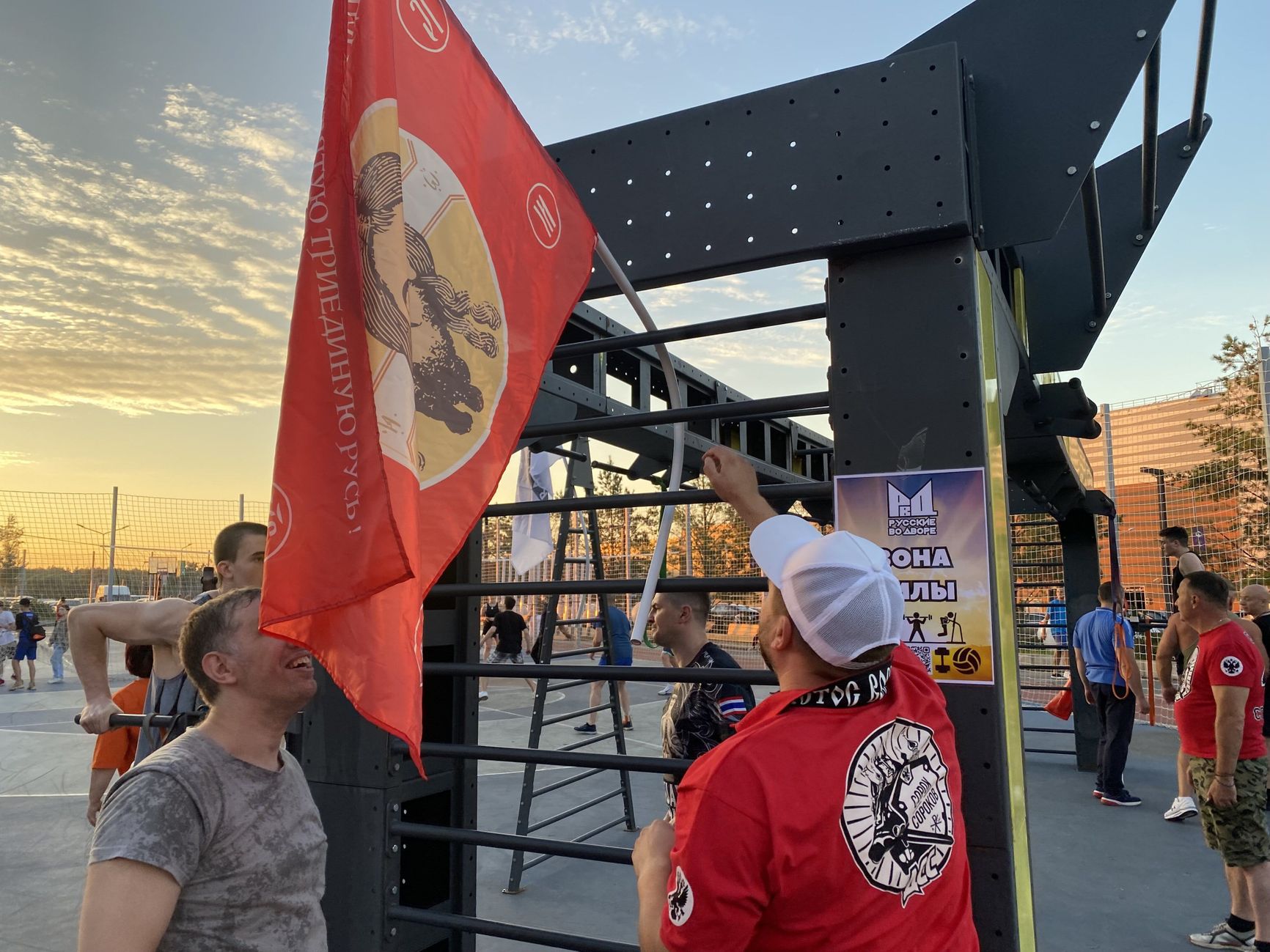
Sorok Sorokov activists hanging banners in Khimki outside Moscow
“Russians are united! They're here, and they're not going anywhere!” How nationalists hold events in parks and sports grounds
“One for all, and all for one! The Russians are in the yard!” — several dozen Russian Community supporters chant together with their children while running around the stadium near the Mega shopping mall in Khimki. The gathering witnessed by The Insider is called “Russians in the Yard.” This is the first in a series of such runs. Finding the venue wasn't difficult: the slogans could be heard from afar, even though the event was announced as a family meeting.
“Russians are cool, united, strong, sober!” — the announcer shouts into the microphone while the crowd, tired after the run, catches its breath. The event is held by the Russian Community, but there are also members of Sorok Sorokov and Northern Man present. Banners with symbols of the organizations hang on the stadium fence. Nearby, two girls are dancing in folk costumes, encouraging passers-by to join in.

A gathering of Russian Community supporters
“We need everyone to see that we’re all together here, that the Russians are united, they are here and aren't going anywhere!” a man in a Northern Man teeshirt articulates to his fellow community member how to attract “their kind” and intimidate “strangers.”
The sports ground at Mega is a popular place. Hundreds of people walk past it to get to the mall and back on a Friday night.
“What a mess. You'd better go get him,” an elderly man outside the stadium says to his wife. Their grandson ran off to join the children participating in the run. “It smacks of nationalism. It has a very bad look,” the man explains. Another woman of Central Asian appearance hastily leads away her children, who rushed to play with their peers taking part in “Russians in the Yard.”
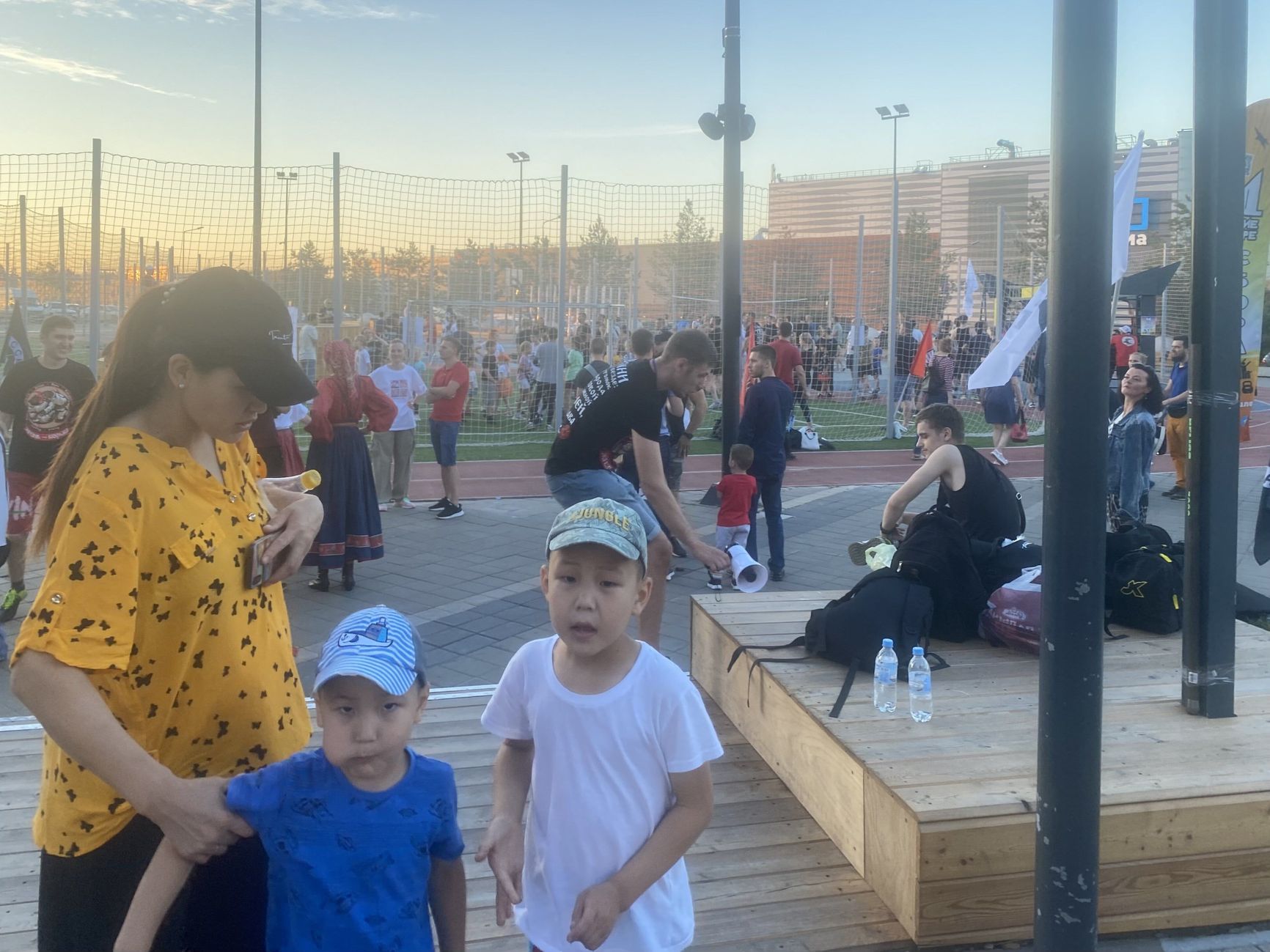
A woman leading children away from a Russian nationalist event
Many immigrants who work at Mega live in the neighborhood. Nationalists tend to favor “migrant” neighborhoods for their events to reinstate the “Russian presence.” A few immigrants are sitting in the stands, watching with interest. “Fascinating!” laughs The Insider's interviewee, a young woman wearing a headscarf with a two-year-old. “We've lived here a few years and we've never seen anything like this. My son’s still young, so he can't go play, but I’d let him join.”
Apart from folk games, children can also play with a knife at a “Russians in the Yard” event. Thus, in Tushino Park on September 16, nationalists organized a knife-fighting workshop for kids. This was the third such gathering in the “yard” format.
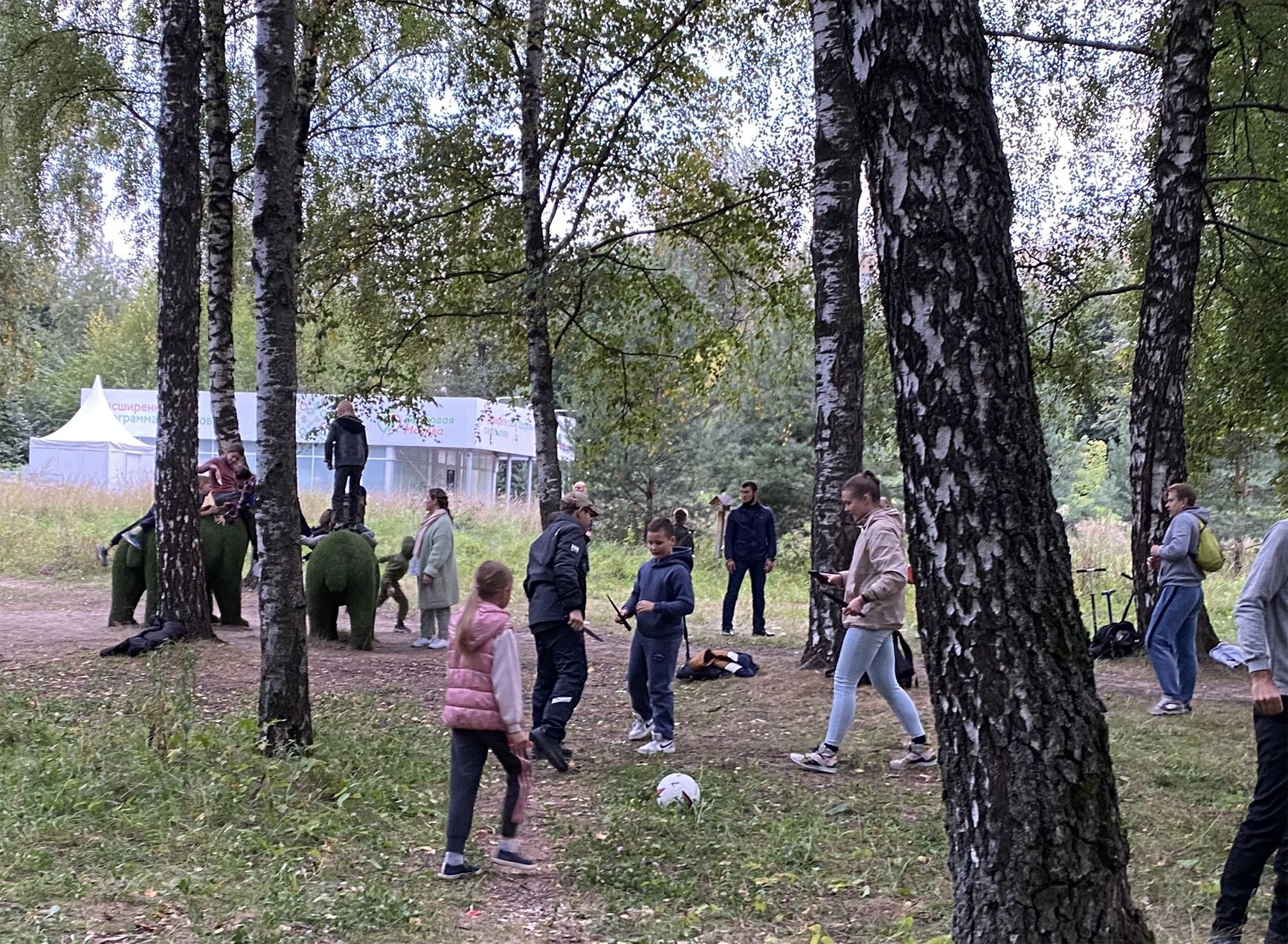
A child learning knife fighting in Tushino Park
The nationalists' preferred activities are wrestling, boxing, and weapons assembly and disassembly.
“I grew up in the Central Administrative District and remember that we never minced words with foreigners, beating them hard and without hesitation,” writes the user Team Volk Rus, reminiscing about the times of skinheads in the chat room Russkaya Obshchina (Moskva) with about 7,700 subscribers. The post has since been deleted because moderators remove overly radical statements. “It's time to bring back the skinheads,” another user writes.
One of the most recent “Russians in the Yard” events took place in the center of Moscow, in Yekaterininsky Park, where the nationalists gathered in the central plaza with a stage – a luxury previously unavailable to such groups. The park management was aware of the event, and the guard even showed us the way. When asked if the meeting had been coordinated, he laughed: “You can't have such a big event without authorization from the top!”
The gathering almost ended in conflict. The nationalists hadn’t foreseen that a warm Saturday evening in the park would attract a large number of locals, including Muslims. And when community members began giving out free pancakes, a few women in hijabs, who were walking with their children in the park, came up to the stalls. This greatly annoyed Russian Community supporters, including Butovo resident Eugene:
“There's a wrapped up churka [another Russian derogatory term for a person of Central Asian descent] standing with her brood, and she gets a huge pile of pancakes, while Russian children don't get any! I don't get it: are we against churkas or not?! Why are they serving these broads whose husbands rape and kill our children? To be honest, I'd like to get out of here already.”
Like many others, Eugene, 32, joined the community in the summer of 2023 and began volunteering at “Russians in the Yard” events, as well as donating to the “treasury for assistance to ethnic Russians”:
“A woman whose house burned down reached out, so we used some of the money to help her rebuild it. There are many different situations when you need help; when you need money.”
But handing out pancakes to Muslim women infuriated him, and now he says he has “a lot of questions” for the organizers.
“The domination of churkas and all this immigrant lawlessness makes you want to forget all about tolerance,” explains Alexei, a participant from the Chertanovo District, speaking about his motivation for joining the community. According to him, immigrants are insolent and prone to violence even on the playground: “A friend's daughter was swinging on a swing that accidentally hit an immigrant child. His mother came running at once and started swearing at the girl and her father when he approached,” says Alexei. “And then the churka husband came along and slashed his friend's eyebrow, in a cowardly way, as he bent down to pick up his phone.”
Alexandra, who came to the event with her eight-year-old daughter, is also annoyed by women in burkas. The woman has been in the community for a few months, also because of immigrants:
“Remember there was a time when residential blocks were blown up in Moscow, when there were terrorist attacks in the metro? I got it hardwired in my brain that everyone wrapped up like that could be a terrorist! She might have an explosive belt underneath. Who can tell? I’d get off the subway car whenever such a woman got on. I still feel uneasy when I see one. And there are more and more of them!”
According to her, she once had a conflict with a Muslim: while jogging, Alexandra took a photo of a woman in a hijab, and the latter allegedly attacked her, forcing her to delete the photo.
“Yale University is where all the psychos graduate from”: The Russian Community's academic foundations
In addition to outdoor activities, the new wave nationalists also offer cultural events. Russian Community supporters attend lectures by Roman Silantyev, the very expert whose conclusion based on a non-existent discipline called “destructology” laid the foundation of the criminal case against director Evgeniya Berkovich and playwright Svetlana Petriychuk. The scholar found signs of extremism in their play Finist Yasny Sokol [Finist the Brave Falcon] about Russian women who flee to Syria to marry terrorists. Based on his “expert” examination, Berkovich, who is raising two children with special developmental needs, was accused of justifying terrorism and sent to a pre-trial detention center.
It was on destructology that Silantiev gave a lecture at the Russian Community on September 16. The “expert” spent more than an hour explaining to listeners why the Ukrainian authorities are essentially a totalitarian sect. According to him, Kyiv was behind mass fraud calls from “Sberbank security service officers” attempting to steal money from cards and create a database of especially gullible Russians. “We've seen them, those call centers with swastikas!” Silantyev shared.
He also blamed Ukraine for the growing number of teenage suicides in Russia, saying it promoted “death challenges” among Russian schoolchildren. Even school shootings in Russia are allegedly Ukraine’s doing, according to Silantyev. About 80 people gathered to listen to him at the Cosmos Hotel in Moscow. It was the first such event, and the organizers promised more.
Roman Silantyev at the September 16 lecture for the Russian Community. The book on the table reads “Satanists against Biological Garbage”
Silantyev also gives lectures for Federal Security Services (FSB) officers and, according to the portal ChechenNews, is a reserve FSB colonel. He heads the Human Rights Center of the World Russian People's Council under the patronage of the Russian Orthodox Church and Patriarch Kirill. As a cherry on top, Silantyev consistently promotes conspiracy theories that the U.S. is harming Russia through NGOs, sects, and Wahhabis. He holds notoriously Islamophobic views, which explains a lot about his collaboration with the anti-immigrant Russian Community.
Apart from Silantyev, community members listened to a presentation by another odious propagandist “expert” – Mikhail Kurochko, a candidate of philosophical sciences, associate professor, and reserve colonel. His main occupation is raising political awareness in Russian military units. Thus, in a lecture for the 43rd Separate Railroad Brigade at Military Base 61207, he warned that Satanists had seized power in Ukraine and the country had been “driven to this point by neo-paganism.” He also spread the myth that you have to “become a pederast” to join Yale's secret student society Skull and Bones.
“The organization is based at Yale University – that's where all the psychos graduate from,” the scholar summarized.
The third expert at Cosmos Hotel, Larisa Margorina, a practicing lawyer and law professor, addressed the most pressing issue for the ultra-right: how not to end up in court for extremism. She drew some examples for her lecture from the Russian Community's online chats. These statements have now apparently been deleted.
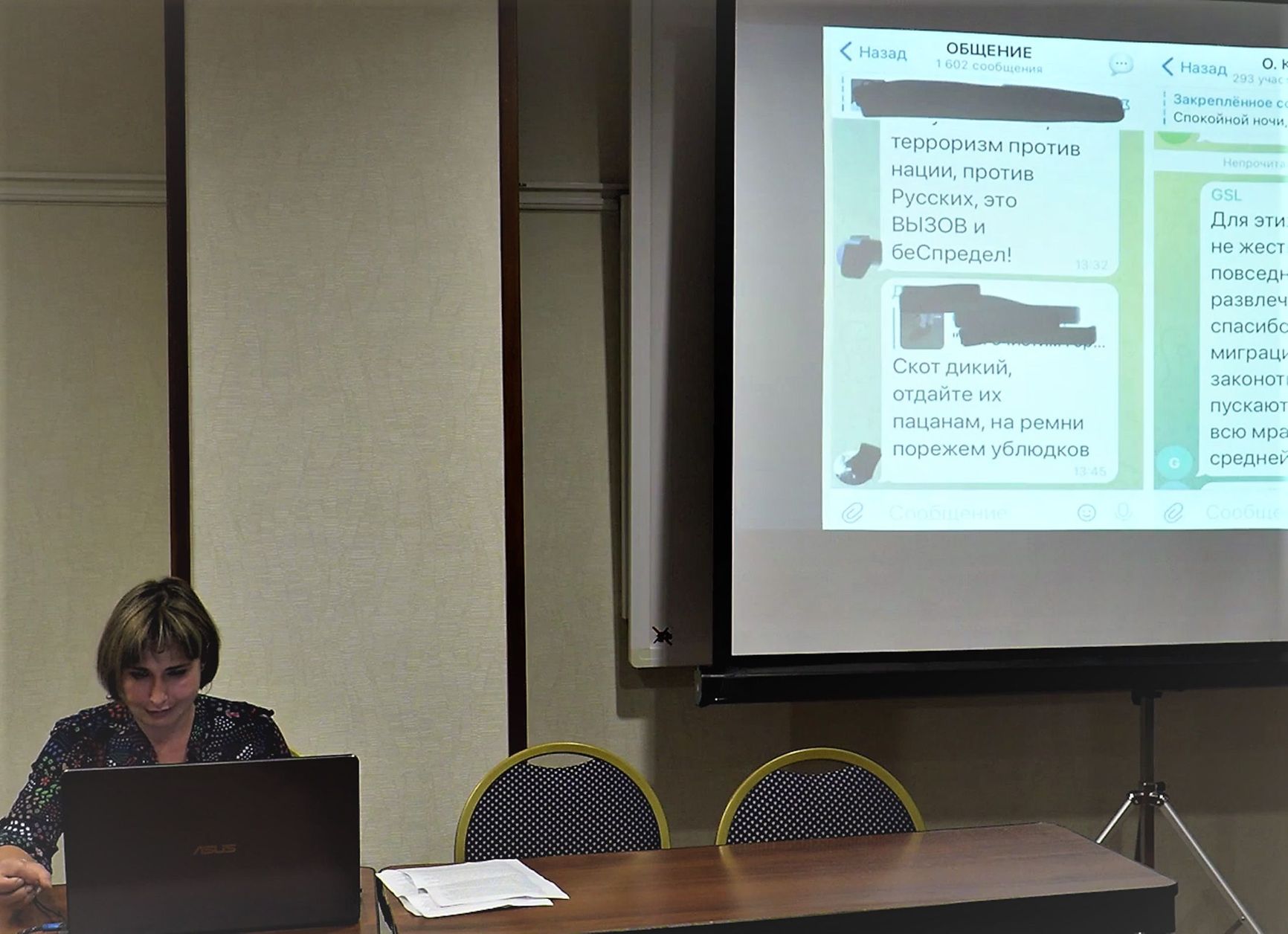
Lawyer Larisa Margorina showing an example of a radical statement in a chat at a lecture for Russian Community nationalists
Her presentation was the most academic: she spoke about the legal specifics of criminal liability under Article 282, which was applied to leaders of nationalist groups in the 2010s, and analyzed the concept of extremism. This knowledge can come in handy for nationalists because aside from workouts and political education, the Russian Community forms brigades to deal with immigrants.
A tough-guy-hailing app
Community members have the option of summoning a group of “tough guys” to the scene of a conflict with immigrants to show that ethnic Russians are ready to stand up “for their kind.” For this purpose, the Russian Community created a mobile app with an alarm button: called Community, the app is available in the App Store and Google Play. In case of conflict, a community member posts a message through the app. All participants receive a notification with a geolocation tag; the information is also shared in Telegram chats. Those willing to help are supposed to show up and “handle the matter,” with or without police.
Community members have the option of summoning a group of “tough guys” to the scene of a conflict with immigrants
Moscow resident Anatoly had the opportunity to check out the “unique service” on August 5, 2023, when he was with his wife and daughter on Meshchersky Pond in Solntsevo. The app malfunctioned (which is business as usual, judging by the complaints in the chats), so he wrote in a Telegram chat: “A group of Arabs won't let girls bathe. We need support for our sisters.” A few community members who lived nearby soon arrived at the pond, and so did the police. The conflict was resolved peacefully; the offenders eventually apologized and left. Meanwhile, Anatoly had to deal with the police, who took an interest in the large group of “tough guys.”
“A cop from Solntsevo called. I have to go give a statement. They are suspicious of our community's mass gatherings. Lawyers, what's the right way to present it?” — Anatoly inquired in the chat room. “Now they're going to ask how I know you and everything about the group.”
Notably, assistance is provided only to the registered community members. The organizers also decided against helping the inebriated, which sparked some controversy. Some community members said it was unfair; some even walked out in protest. However, others believe the restriction is justified.
“Persons under the influence of alcohol should learn their lesson... That's only fair. God help them,” a member writes.
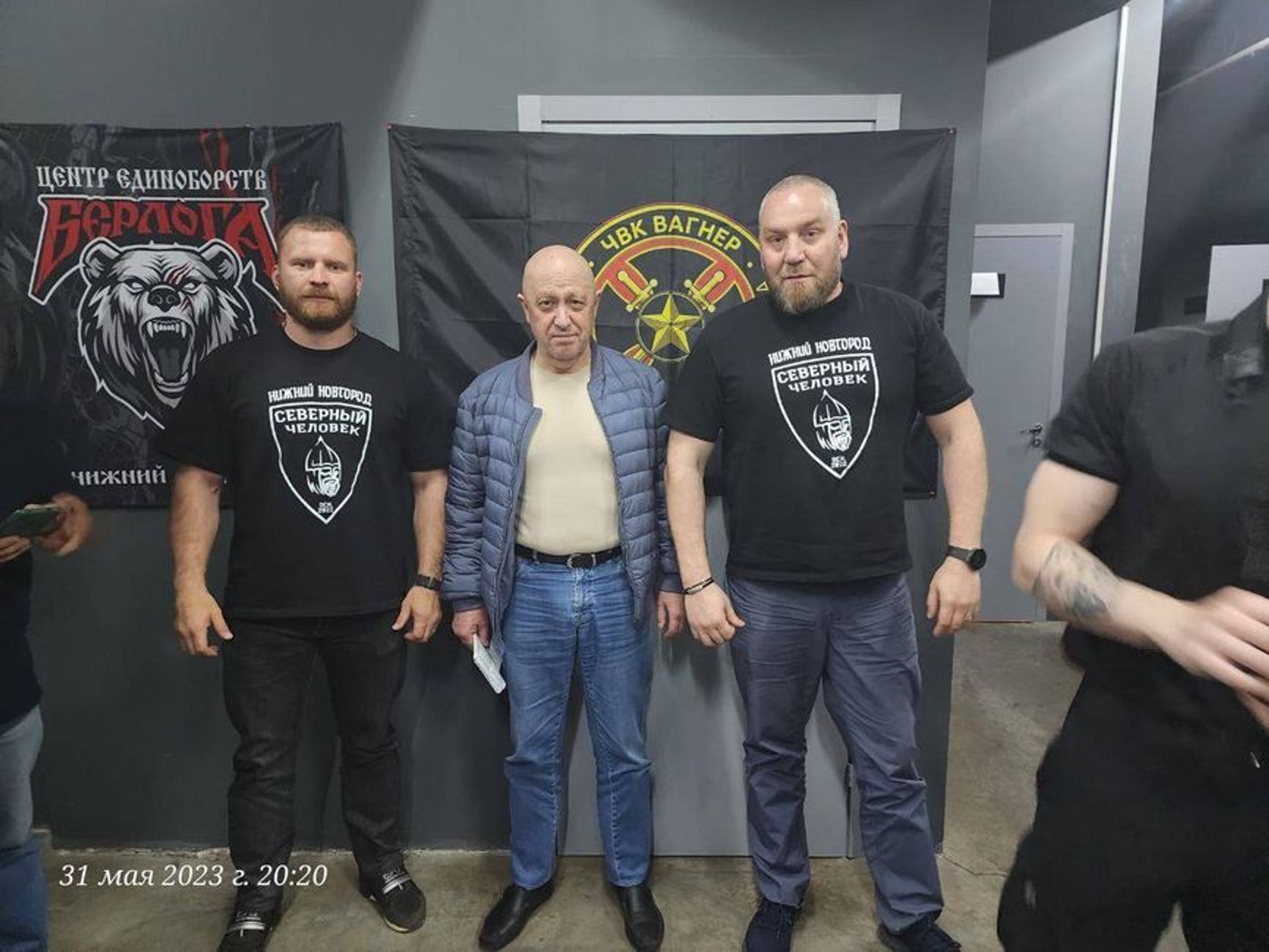
Northern Man community coordinators in a meeting with Wagner PMC chief Yevgeny Prigozhin in 2020
The Northern Man community is also developing an app. Both associations are actively recruiting followers. Newcomers have to fill out an application form, stating their age, occupation, family status including children, religious beliefs, and preferred sources of information about nationalist activism. In the chats, many were alarmed by the fact that you can't join the Russian Community without providing personal data. Northern Man went even further, demanding the passport number from all applicants.
“So that nationalists can be all put on file, hunted down, and sent to the front in one fell swoop?” wonders one of the users.
“If you get killed, how is the money going to help?”
Early in the fall, Central Asians living in Russia legally also got reasons to worry. Police in Belgorod, St. Petersburg, Krasnodar Territory, and Chuvashia have already detained dozens of immigrants who already obtained Russian passports. They were taken to military enlistment offices for registration.
In New Moscow, not only migrant workers, but also students, doctors, and medical staff at Hospital No. 40 in Kommunarka have become victims of police raids. Police pay special attention to the area adjacent to the Ispanskiye Kvartaly apartment complex, including the numerous construction sites, the Food City wholesale and retail market, and the Indigo industrial zone. The district has many international students from Moscow State University, RUDN, and MGIMO.
Police vans on standby have become a familiar sight for the locals. This time, two police officers detained a group of students. Neatly dressed young guys, who hardly look older than 18, try to explain to the officers that they are programmers, and one is a future doctor.
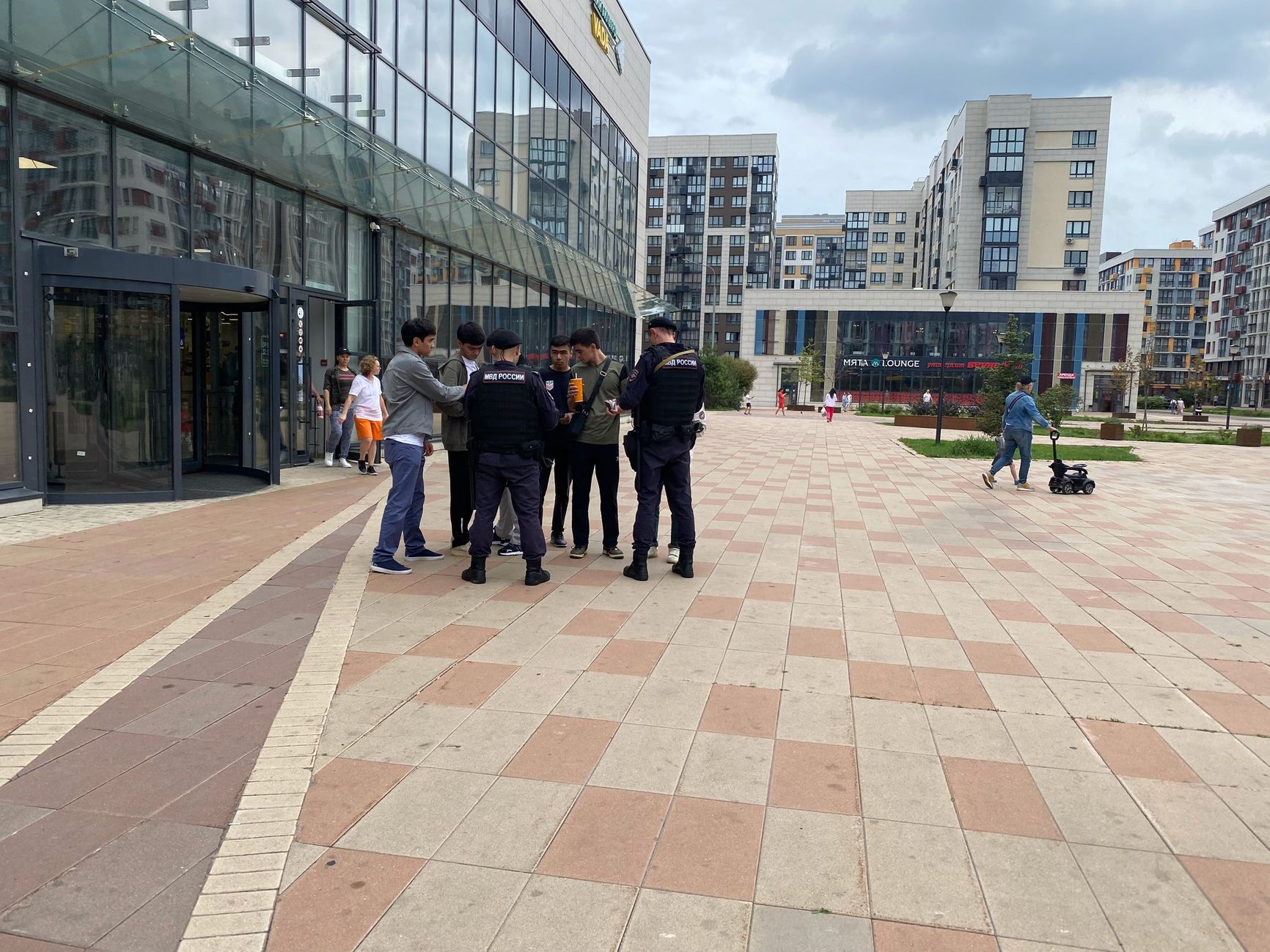
Police officers raiding the streets of a residential compound in New Moscow
“I think it's all for the war, all these raids,” suggests Samir from Kotelniki. “It’s their way of intimidating us and forcing us to go to war. They threaten to deport us otherwise. And I don't want to. Not just me personally; none of us do. I'm not Russian, why would I want this war? Sure, they promise citizenship and some money. But you only live once. If you get killed, how is the money going to help?”
Rumors are circulating in the immigrant community about “Operation Migrant” – the beginning of long raids in all Russian cities. Allegedly, those with Russian passports will be the first to be sent to the front in Ukraine, “to the slaughter.”
The rumors aren’t entirely ungrounded. As Holod wrote, Tajik national Dalerdzhon and several other foreigners who were detained, had their passports taken from them, and expected deportation, were instead brought to a military base in the Leningrad Region on May 3. However, the detainee insisted he hadn’t signed the contract. A scan of the order published by Baza suggests that Moscow police have been instructed to give priority attention to persons with Russian citizenship when identifying those who are not on the military register.

Importantly, the laws of Central Asian states prohibit mercenarism, which includes participation in hostilities on behalf of foreign countries. In Tajikistan, those fighting on the Russian or Ukrainian side face up to 20 years in prison, in Kazakhstan, up to 12 years, in Kyrgyzstan, up to 15 years with confiscation of property, and in Uzbekistan, up to 10 years.
“It's not a pleasant sight when you see nothing but the eyes!”
Like the inhabitants of Kotelniki, many residents of Ispanskiye Kvartaly welcome the raids. The immigrants admit it themselves. “To get the lay of the land, you should check out our neighborhood Telegram chat and see what locals write there. Forgive my bluntness, but this is pure Nazism, only in the CIS,” Sohrob explains, lowering his voice. “Look, probably 60% of the residents in this neighborhood are... well, non-Russian. And the Russian locals don't want to see Muslims. They want the neighborhood all to themselves.”
It didn't take long to find ardent opponents of immigrants. The first three women The Insider correspondent met in the Silikat Microdistrict near Kotelniki are very vocal in their discontent. In fact, they’re eager to explain why they’re so unhappy with the newcomers. The first one, Tamara, exclaims indignantly:
“We don't like it at all! They are in our country, and they should listen to us and take off all these burqas! It's not a pleasant sight when you see nothing but the eyes! What do we tell our kids when they ask why the lady is dressed like that? What can we say?”
Why not answer that this is their custom? The Insider's interviewees laugh and begin to explain:
“Well, we've never had anything like that before! And we still don't. Let them do it in their home country. But they're having their little get-togethers here. It's not right.”

Residents of the Yuzhny Microdistrict at a playground
Speaking of the reasons for disliking immigrants, the interviewees first of all point to their appearance and manner of dress and only then move on to more thorough arguments: “They drink a lot, saying: ‘Allah is up there – he doesn't see us.’ And yet they want a mosque! We just don’t get it,” Tamara complained. “They put their feet up on the benches, take off their shoes and sit barefoot. And they all have fungus – they buy ointment at pharmacies all the time. I work there, so I would know. They also often buy sedatives for their babies to stop them from crying. They don't give pacifiers, using a piece of paper or a rag instead. Or a candy wrapper. It's very frustrating to watch them on the playground.”
One of the activists was purportedly attacked by immigrants to stop her from reporting “elastic apartments” inhabited by dozens of immigrants to Rospotrebnadzor (a supervisory body). Male immigrants allegedly harass girls and young women, so local parents make sure to fetch their daughters from school. Immigrants litter and spit sunflower seed shells on the ground, as my interviewees complain. Meanwhile, a group of non-Slavic-looking guys on a nearby bench by the pond are peeling seeds into a bag. “It’s only because we're always telling them off!” women shout in unison.
The Insider's interviewees boast that they helped send an appeal to Putin, collecting signatures under a request to deal with immigrants, and participate in other forms of local activism. They call themselves “the few remaining Russians in Kotelniki.” However, the video of the appeal doesn’t feature any clear demands, except for the request to install more surveillance cameras. In general, they just want the authorities to “do something about the situation, stop bringing in immigrants, and deport the existing ones.”

A police van in the Ispanskiye Kvartaly apartment complex, New Moscow
Local immigrants believe Russian long-timers exaggerate. “I lived there too, and no one bothered anyone. We even sometimes saved their children from local Russian pedophiles and drunks, rescued their cats and dogs, helped them move apartments, carried their belongings, and even welcomed [our Russian neighbors] at our weddings, in line with the tradition,” argues Tajik national Ahmad. “Looks like they don't appreciate good deeds.”
In December 2022, Ahmad was deported to his home country because he lacked the papers. He doesn't think he's guilty, though. According to him, the Russian government has created a system that makes it easier to enter Russia and work there illegally, which is what his compatriots take advantage of.
A girl in a headscarf walks by, staring at her phone.
“Here she comes, with her face all wrapped up. Her heels are dirty, but her head is all covered. What do we need them for?” Tamara almost shouts. “It's Moscow, not some random town! And these women haven't worked a day! All they do is spread their legs and breed. In hordes! If we really do need a larger workforce, what good are all those women? All they do is get Moscow benefits now that they’re registered here!”